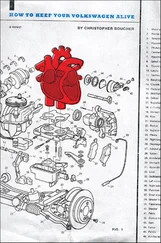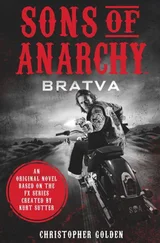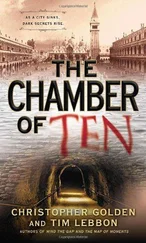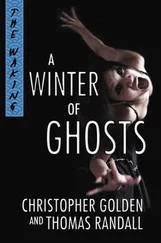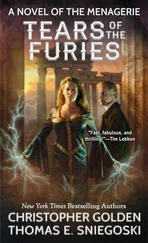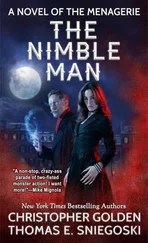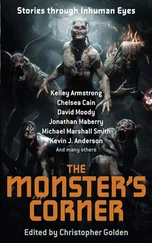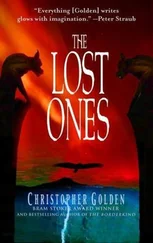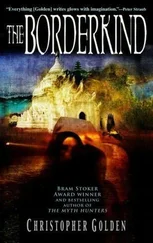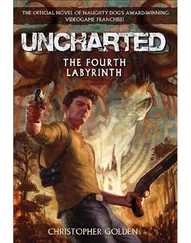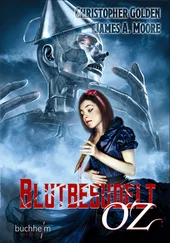“I can’t jump with it, though,” I said. My eyes filled with liquid words.
“Oh come on,” my Dad said. His jaw hardened and he shook his head. “You know what? Sometimes I think your mother’s right about you.”
I started to cry.
“You have no idea how privileged you are,  . To even live in Appleseed. To ask for something, and boom — to have it given to you.”
. To even live in Appleseed. To ask for something, and boom — to have it given to you.”
I wiped my face. “I can’t jump with it, though.”
My Dad shook his head. “Unbelievable.”
We didn’t speak the rest of the way home. When we pulled into the driveway, though, my Dad hoisted the bike out of the truck and went to work fixing it up: he lowered the seats, tightened the chain, put air in the tires. I sat in the truck, pouting, until he came to the window. “Give it a try at least,” he said.
I got out of the cab and silently swung my leg over the front seat. Then I pushed off and tried to pedal. The bike wobbled and I almost fell; I could barely push it forward — it took all my strength to get it up to speed. I slowly ambled to the intersection of Converse and Lake and then turned back around; when I reached the driveway I was completely out of breath. I jumped off the bike and let it drop to the pavement. “I can’t even pedal it,” I said.
“You just did!” said my Dad. “And it’s probably great exercise.”
“This sucks !” I shouted, and I ran inside.
“What sucks?” my Mom said.
“Dad got me a bike built for two people !” I hollered.
“Cool!” my Mom said.
When I showed up at the Dunes the next day with the Bicycle Built for Two, my friends were already pedaling up the trails. As I was huffing up Erskine, though, Joyce saw me and stopped. “Look at  !” he said.
!” he said.
Everyone rode over to me.
“That bicycle
has two seats,” said Rory Couplet.
“It’s a bicycle
built for two,” said James Couplet.
I was breathing heavily.
“That bike’s a parody ,” said Spondee, smiling dumbly. “Does it speak Middle English?”
Large Odor laughed.
Then they took off and I followed, taking the last place in a sentence of bikes that whipped up the path, looped back, and tore down the sandy hill. I fell behind a little, but stayed with them as best I could. When I hit the loose sand on the path, though, my tire wobbled and I fell onto my side. Large Odor saw me fall and circled back. “You OK?” he said.
I pushed the bike off me and sat up, trying not to cry.
Then someone shouted “Capital!” and Odor and I looked up to see Dave Capital pedaling over Homicki Hill on his Viper. Capital skid-braked right in front of us. “HEY,” he said. “HEAR ABOUT TEMPLETON?”
“What about him?” said Odor.
“HE’S ABOUT TO FIGHT PAYNE.”
“Where?” said Joyce.
“THE PATH,” said Dave.
“When?” said Spondee.
“RIGHT NOW. LIKE, TEN MINUTES AGO,” said Dave.
Everyone got on their bikes. I righted my Bicycle Built for Two and followed: we snaked over Homicki Hill, up Redfern, left onto Williams, and toward the town line.
A mile or so before the line, though, I started falling behind. The rest of the gang pulled twenty feet ahead of me—“Slow — down,” I tried to shout — then fifty (“Guys!”), then so far they couldn’t hear me. No one even looked back to see where I was. Like I said, they weren’t good people — they certainly weren’t my friends , at least.
Right around Wolf Swamp I lost sight of the Syntax Gang — they were just too far ahead. After another few minutes of pedaling, I turned around and rode for home. When I reached my house I was drenched in sweat. I threw my dumbike on the grass and went inside, opened up the chip drawer, found a bag of Sour Cream and Onion and tore it open. I picked up a chip and it read my face. “What’s wrong?” it said.
I ate that chip and picked up another. “Tell me your troubles,” it said.
“I hate my life,” I said, and ate it. Then I picked up a handful of chips and shoved them into my mouth all at once. “Stupid bike,” I said, my mouth full. “And my friends—” I chewed, “—and my mother—”
“I understand,” said a chip in the bag.
“I’m all alone,” I told the chip, and ate it.
“No, you aren’t,” said another chip in the bag. “You still have us.”
“You mean it?” I asked it, and ate it.
“We aren’t going anywhere,” said another chip. I ate that one and another one and another one and another one. I ate them all.
I showed up at the Dunes a few more times, but soon I stopped going. I continued talking to some of those kids — Large Odor, Spondee — but after a while we kind of drifted apart. One day a few months later I said hi to James Couplet and he looked through me like I wasn’t even there.
“Couplet!” I said, but he just kept walking.
Maybe I wasn’t there, a thought suggested.
I watched James smooth around the corner and I turned and walked the other way. Then I saw a fire alarm in the hallway up ahead. Without even really thinking about it, I ran up to the alarm and pulled it. Blue ink sprayed all over my hand and face.
All of the classroom doors sprang open; kids poured into the halls.
“See?” I told my thought, the ink running over my arms. “I am here.”
Later that afternoon, an Orange Traffic Police Cone sat down with me in the office at school. “  ,” he said. “I want you to be honest with me. Did you pull the fire alarm?”
,” he said. “I want you to be honest with me. Did you pull the fire alarm?”
“No,” I said.
The Cone looked down at my blue hands — I hadn’t even tried to wash them. “Did — you — pull — the fire alarm?”
“No,” I said again.
The Cone crossed his orange plasticy arms.
A few weeks later, I was unlocking my dumbike when I saw my neighbor, Bobby Lonely — Loneliness, everyone called him — picking his face off by the lacrosse fields. “Hey, Loneliness,” I said.
Loneliness looked at me.
“C’mere,” I said.
He walked toward me. Loneliness smelled like cats, probably because he owned about a million cats. He also had really bad acne; even his acne had acne.
“Need a ride home?” I said.
“Seriously?” he said.
Everyone was always playing tricks on Loneliness: sending him fake prayers, stealing his memories, that kind of thing. I could tell he didn’t trust me.
“Do you or don’t you?” I said.
He shrugged.
I pointed to the backseat and he got on. We started pedaling. It was much easier with another person. In no time at all we were over Apple Hill and coasting down Tanglewood.
“We’re not friends,” I shouted back to him.
“No,” said Loneliness. “I know that.”
Later, Loneliness became really popular. Seemingly overnight, it became cool to have acne. Suddenly everyone wanted acne. I used to send out prayers for it; people used to put acne on with makeup.
When we were in our twenties, though, Loneliness joined the U.S. Army and died. His acne made it back across the mountains, the spine and the margins, but he did not. Loneliness’s acne showed up one day, years after he went missing, limping through West Appleseed, its eyes longing for the past.
For a while I thought the bookworms were just something I’d imagined: figments chasing my thoughts through Appleseed. One time a thought of an arcade said a worm with a beard threatened him outside the Appleseed Amphitheatre. And years later, a thought of green told me that a worm in a leather coat tried to run him down on his way home from the Hu Ke Lau one night.
Читать дальше
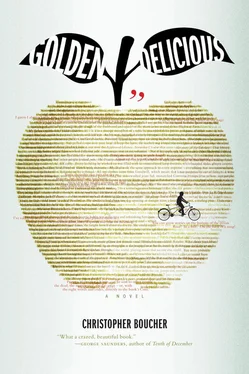
 . To even live in Appleseed. To ask for something, and boom — to have it given to you.”
. To even live in Appleseed. To ask for something, and boom — to have it given to you.”
